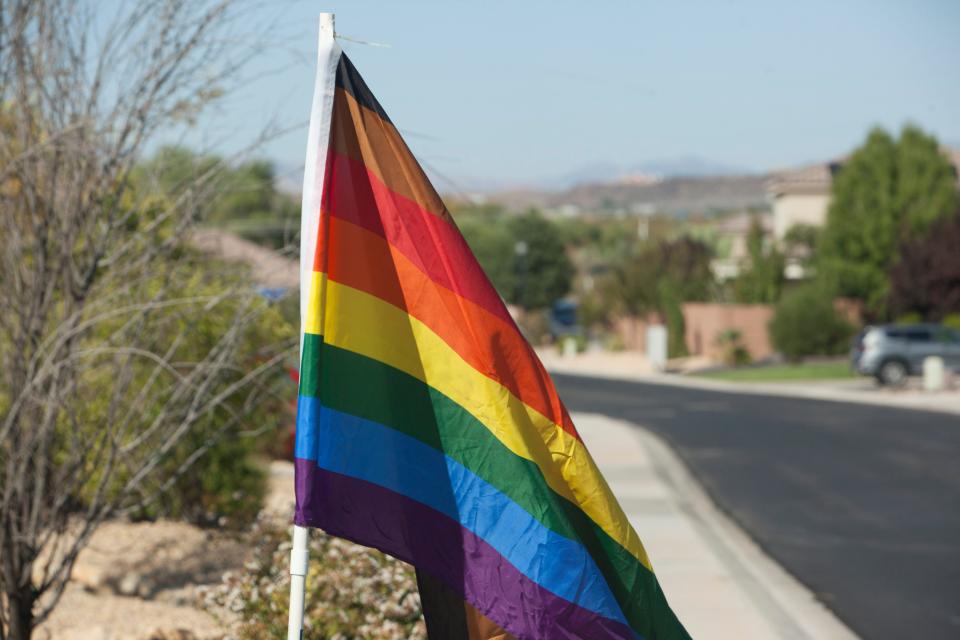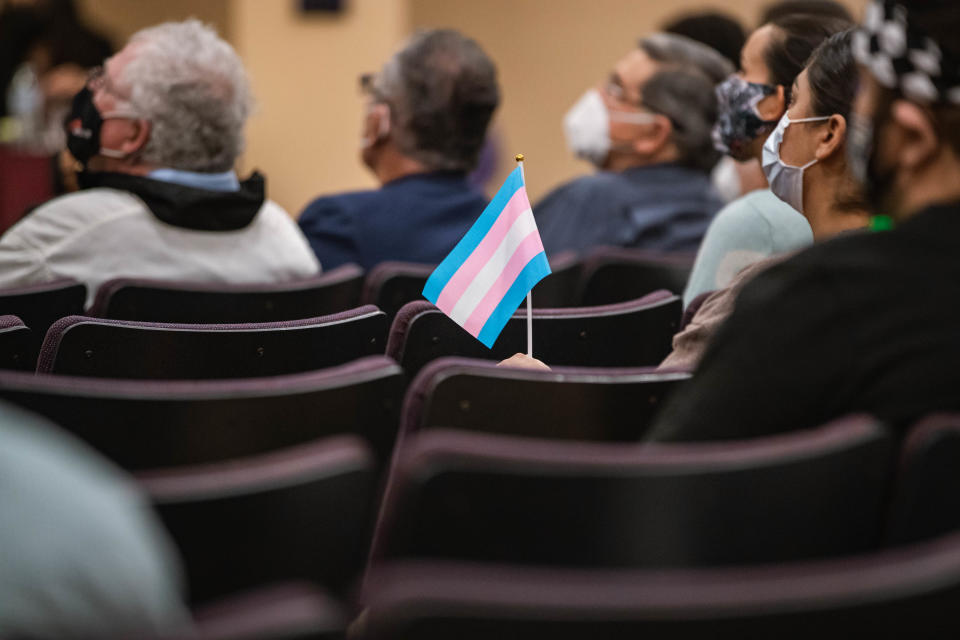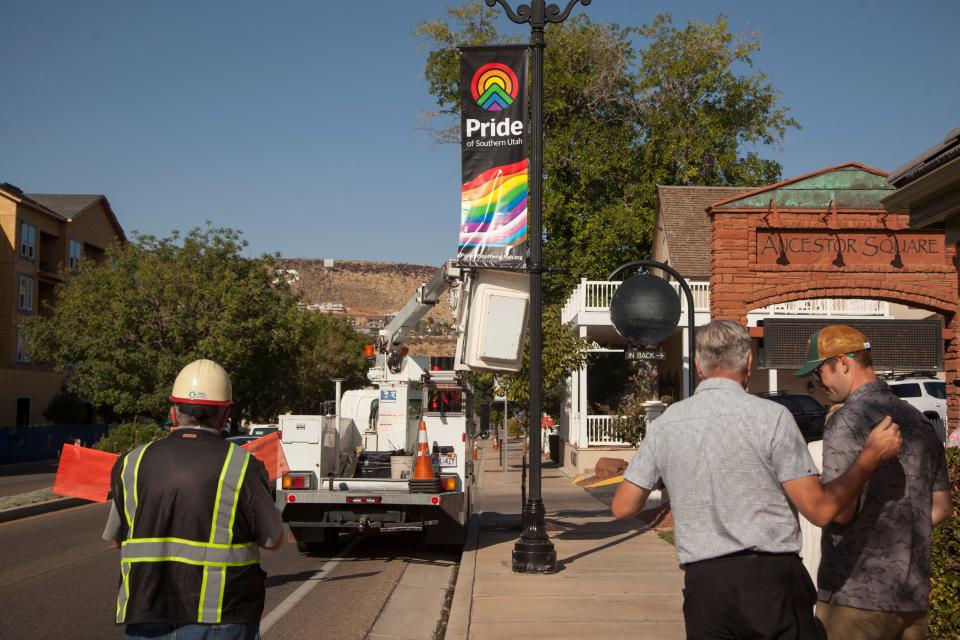Utah lawmaker proposes ban on transgender surgery for kids, limits on gender-based care
A Southern Utah lawmaker is proposing a ban on transgender surgeries for minors and various other restrictions to gender-related medical care.
Reviving a bill that had failed last year, State Rep. Rex Shipp, R-Cedar City, is sponsoring HB 127 in the state's current legislative session, proposing new restrictions on medical treatments that would facilitate a gender transition for children. It would ban any surgery that would help a transition and create a system of obstacles to children and families attempting to access puberty blockers and hormones.
“It's just to protect kids that aren't trans from being damaged before they realize that they aren't,” Shipp told The Spectrum.
But LGBTQ advocacy groups like Equality Utah say HB 127 is a violation of both parental rights and scientific consensus for treatment options for transgender children.
“HB 127 is a violation of parental rights. The government has no right to come between doctors, patients and their parents,” said Troy Williams, the executive director of Equality Utah, an advocacy group based in Salt Lake City. “[This] bill will delay life-saving care. It is reckless and dangerous.”
That sentiment was echoed by Katie Perkins, the executive director of Pride of Southern Utah, which is based in St. George.
“Determining the definition of what is medically necessary or not should be up to physicians and mental health experts,” Perkins wrote in an email to The Spectrum.
Transgender people and mental health
Williams and other supporters with Equality Utah think the bill is dangerous. It would limit and restrict treatment options for people experiencing gender dysphoria, a feeling of distress between a person’s assigned sex and their gender identity. Transgender people and those with gender dysphoria deal with higher rates of anxiety, depression and suicide than the general public, according to the American Medical Association.
Mental health outcomes for children and adults are greatly improved if they’re able to access healthcare that affirms their gender identity, according to groups like the American Academy of Child & Adolescent Psychiatry (AACAP).
"Research consistently demonstrates that gender-diverse youth who are supported to live and/or explore the gender role that is consistent with their gender identity have better mental health outcomes than those who are not," read a statement from the AACAP.

A study from the Stanford University School of Medicine surveyed close to 21,500 transgender people that wanted hormone therapy and found 12,500 got hormones at some point in their life and roughly 8,800 people that wanted but never received hormones. The study found the odds of psychological distress were reduced in the group that received hormones by anywhere from 81% to 222% compared to the group that didn’t get hormones, with those who received hormones earlier in life having better outcomes. Those who got hormones before 18 had reductions from 153% to 222%.
It also found the rate of suicide ideation — contemplating suicide — was reduced at a greater rate when people began taking hormones earlier in life. Those who got hormones at 14 or 15 reduced their ideation by 135%, while those who got hormones at 16 or 17 were reduced by 62% and those who got hormones after they turned 18 only saw a reduction of 21%.
This study aligns with several others produced in recent years concerning the mental health of transgender individuals and has led to a widespread consensus among medical organizations to oppose legislation that restricts gender-affirming healthcare to people under 18. Perkins says she has seen the impact it has when trans and other LGBTQ kids get both medical and social support.
“There is a night-and-day difference, not only in their mental health but their social interactions, self-worth, ability to focus, etc., that factor into their success in navigating adolescence,” Perkins said.
Shipp said he believes that children develop gender dysphoria as a response to problems in their life and that only a small percentage of children “persist” in their gender dysphoria into adulthood.
“Most of them are fine in their biological sex by [adulthood],” Shipp said. “And so they realize they're not really trans, but if they've gone on the hormone blockers they have, they've damaged their bodies.”
Some hormone treatments can negatively impact a person's ability to have a child later in life, according to the University of Utah. But puberty blockers are seen as safe and reversible until the age of 16, according to the American Academy of Pediatrics.
It’s not unheard of for transgender adults to decide to de-transition, but it’s not very common. A study in LGBT Health found that only 13% of adults who seek gender-affirming care have de-transitioned at some point in their lives. But of those who did de-transition, only 16% said they did so because of internal fluctuations or uncertainty around their gender identity. The other 82% of people who de-transitioned said they did so because of external factors, including the social stigma of being transgender, and pressure from family members.
Subscription sale: Only $1 per month for 6 months. Subscribe today!
Not new legislation
This isn’t the first time Shipp has run this bill. Last year, Shipp sponsored the unsuccessful HB 92, which would have banned both surgery and hormones for minors. This year's proposal removes some of the stricter language, allowing a path for kids to get gender-affirming healthcare.
Last year's version failed to get out of committee. Shipps says he doesn’t love the changes in the new bill but they were included to make it more acceptable to others.
“I'd really rather just ban the use of blockers and hormones until they’re 18,” Shipp said. “I'd rather ban it because I think that's going to protect the best, but I didn't think I could get that through our legislature.”

The version of the bill currently supported by Shipp is also a substitute for what was originally filed. The current version says for a child to get puberty blockers or hormone treatment they would need to be diagnosed with gender dysphoria — a process that can take up to six months and require multiple therapy sessions — and then wait 18 months after the first diagnosis and attend at least nine therapy sessions. Shipp says it would create a more formal process for hormone treatment.
“Hey, let's wait, maybe you'll be fine. If not, when you get to a certain age, you can do the transitioning,” Shipp said.
This version would also eliminate the data-gathering and reporting requirement for minors who receive hormones, something that was in some earlier versions of the bill.
Both Williams and Perkins say the current system in place for kids to receive therapy works, since children already need parental permission and go to therapy or consult with a medical professional before taking any kind of prescribed hormone or puberty blocker.
“It's not like these kids are signing themselves up for gender-affirming hormone therapy or medical procedures,” Perkins said. “They first must speak to their parents about it and get their consent before even speaking to medical professionals — that first barrier alone prevents many LGBTQ+ youths in Utah from getting the care they need.”

Williams does acknowledge that the standards of care could be more “fine-tuned” as more research is done on the issue but said the current system has checks in place, where kids can socially transition and see if they want to continue the process before they use any medical treatments to further their gender transition.
“It's a long process because you do want to make sure that the child's on the right trajectory,” Williams said.
The bill would ban all surgery that would be used to help facilitate a gender transition for a child, even if the child had parental permission. Surgeries for children under 18 are very rare, according to Williams.
The University of Utah Transgender Health Program does offer transition surgeries but prefers recipients of the surgery to be over 18 years old and have been on hormones for over 12 months.
The bill also extends the statute of limitations for medical malpractice lawsuits to be brought against physicians who administer gender-based treatment options. Currently, the statute of limitations for medical malpractice is two years, but depending on which version of the bill passes it would extend the statute until a potential plaintiff turns 27 years old.
The current version of the bill would also ban girls from getting “cosmetic” breast surgeries that would reduce breast size for non-medical reasons.
Other transgender-related efforts in Utah
This isn’t the only bill relating to transgender healthcare in Utah right now. One concerning transgender participation in youth sports, HB 11, would create a commission to regulate how transgender athletes can participate in school sports. This bill has mixed support from advocacy groups but has already passed out of committee, Shipp’s bill is still waiting for a hearing.
More: Utah lawmakers propose panel to decide when transgender athletes play in youth sports
The bill might get changed more before it gets a hearing, according to Shipp. He said he would stop sponsoring the bill if too many changes occur. It's unlikely the bill would take effect without serious legal battles, something already faced in other states that have passed similar legislation.
Similar bills to HB 127 were run across the country last year, with 21 states considering bills to restrict gender-affirming care to minors. Of those 21, only Arkansas actually enacted a bill into law, but it’s not currently in effect since a federal court temporarily blocked the bill from taking effect, due to a lawsuit filed by the American Civil Liberties Union.
“This bill will trigger lawsuits because discrimination against transgender people in America — and in Utah — is unconstitutional,” Williams said.
Utah’s Governor, Spencer Cox, a Republican, also promised to veto Shipp’s more stringent 2021 bill if it was able to pass the Legislature. Both Williams and Perkins said they hope this bill goes nowhere in the Utah Legislature since they view it as a negative step in Utah's treatment of LGBTQ people, which has improved in recent years.
Williams points to how Utah banned conversion therapy in 2020, and how the state included transgender people in its hate crime laws and anti-discrimination laws for housing and employment before that.
Currently, the bill needs to be voted out of the House Health and Human Services Committee but the bill hasn’t appeared on the agenda for this committee yet. But Shipp is hopeful the bill will be considered soon.
Sean Hemmersmeier covers local government, growth and development in Southwestern Utah. Follow on Twitter @seanhemmers34. Our work depends on subscribers so if you want more coverage on these issues you can subscribe here: http://www.thespectrum.com/subscribe.
This article originally appeared on St. George Spectrum & Daily News: Transgender surgery for kids in Utah would be banned under proposal

